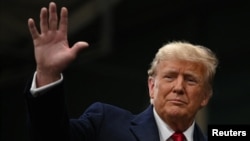Donald Trump was the projected winner of the Iowa caucuses Monday night, based on early results in the first voting in the 2024 U.S. presidential campaign.
The margin of his win was still unknown, with Jeff Kaufmann, the Iowa Republican chair, telling The Des Moines Register on Monday, “It might be midnight that we have every single piece of data come in."
The former president’s supporters endured a historic and life-threatening cold snap to participate in caucus meetings that unfolded in schools, churches and community centers across the state.
Florida Governor Ron DeSantis and former U.N. Ambassador Nikki Haley were in a battle for second place.
The latest polling had shown that Trump was positioned for a substantial victory in the Republican caucuses as he tries to eventually reclaim the White House in November’s national election.
A final Iowa poll released over the weekend by the Des Moines Register, NBC News and Mediacom showed Trump with 48% support among likely Republican voters headed to 1,657 caucus sites.
The survey showed Haley, Trump’s one-time United Nations ambassador, trailing with 20% support, DeSantis with 16% and tech entrepreneur Vivek Ramaswamy with 8%.
A wild card in the process is just how many voters will travel on treacherous, icy roads in extremely cold temperatures to get to the caucus sites. No early voting or by mail voting has been permitted.
Trump joked to a rally of his supporters Sunday, “If you vote and then pass away, it’s worth it,” prompting laughter. “You’ll be safe and all. You’re going to be safe. … You’re going to be all indoors, but you’ve got to get up; you’ve got to vote. Because it has nothing to do with anything but taking our nation back, and that’s the biggest thing there is.”
In the immediate weeks ahead, more states are holding political primary and caucus elections to pick the Republican and Democratic presidential nominees, who will officially be nominated at national party conventions in July and August.
In the end, most polling and political analysts predict another contest between two aging politicians, Trump, 77, and President Joe Biden, 81. It would be a replay of the contentious 2020 election when Biden thwarted Trump’s reelection bid after a single term in the White House.
While Iowa is just one of 50 states, the heartland state holds an outsized role in the U.S. presidential nominating process. It is the first state to vote in the quadrennial elections. Even so, Democrats this year opted for mail-in balloting that will be tabulated later, in part because Iowa has turned decidedly toward Republican candidates in state and national elections.
The Iowa campaign has lasted for months, with several key Republican presidential aspirants already dropping out of the race for lack of support even before the voting, including Trump’s vice president, Mike Pence, former New Jersey Governor Chris Christie and South Carolina Senator Tim Scott.
With Trump holding a commanding lead, the vote in the caucuses has seemingly turned into a race for second place, with both Haley and DeSantis hoping a close finish behind Trump will give them a boost in the Jan. 23 party primary in the northeastern state of New Hampshire and succeeding states.
Trump is facing an unprecedented 91 criminal charges across four indictments and trials. Some of the cases could occur in the coming months, including one in Washington set for March 4 accusing him of illegally trying to upend his 2020 election loss. But the criminal charges played little role in the lead-up to the Iowa vote.
Both Haley and DeSantis have shied from consistent, vocal political attacks on Trump for fear of alienating his supporters, although they assailed his refusal to attend five debates to confront him directly.
They have chided him for an increasing national debt during his White House tenure and failure to build the wall along the U.S.-Mexico border that he promised in his successful 2016 campaign to curb migrants from crossing.
